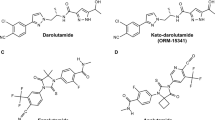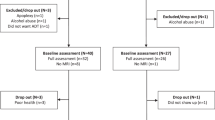Abstract
Purpose
Prior research examining the impact of androgen deprivation therapy (ADT) for prostate cancer on cognitive performance has found inconsistent relationships. The purpose of this study was to systematically review the existing literature and determine the effect of ADT on performance across seven cognitive domains using meta-analysis.
Methods
A search of PubMed Medline, PsycINFO, Cochrane Library, and Web of Knowledge/Science databases yielded 157 unique abstracts reviewed by independent pairs of raters. Fourteen studies with a total of 417 patients treated with ADT were included in the meta-analysis. Objective neuropsychological tests were categorized into seven cognitive domains: attention/working memory, executive functioning, language, verbal memory, visual memory, visuomotor ability, and visuospatial ability.
Results
Separate effect sizes were calculated for each cognitive domain using pairwise comparisons of patients who received ADT with (1) prostate cancer patient controls, (2) noncancer controls, or (3) ADT patients’ own pre-ADT baselines. Patients treated with ADT performed worse than controls or their own baseline on visuomotor tasks (g = −0.67, p = .008; n = 193). The magnitude of the deficits was larger in studies with a shorter time to follow-up (p = .04). No significant effect sizes were observed for the other six cognitive domains (p = .08–.98).
Conclusions
Prostate cancer patients who received ADT performed significantly worse on visuomotor tasks compared to noncancer control groups. These findings are consistent with the known effects of testosterone on cognitive functioning in healthy men. Knowledge of the cognitive effects of ADT may help patients and providers better understand the impact of ADT on quality of life.



Similar content being viewed by others
References
National Comprehensive Cancer Network (2013) NCCN clinical practice guidelines in oncology version 2: 2013 Prostate cancer information. http://www.nccn.org/professionals/physician_gls/pdf/prostate.pdf. Accessed 01 June 2013
Alibhai SMH, Gogov S, Allibhai Z (2006) Long-term side effects of androgen deprivation therapy in men with non-metastatic prostate cancer: a systematic literature review. Crit Rev Oncol Hematol 60:201–215. doi:10.1016/j.critrevonc.2006.06.006
Akaza H (2011) Combined androgen blockade for prostate cancer: review of efficacy, safety and cost-effectiveness. Cancer Sci 102:51–56. doi:10.1111/j.1349-7006.2010.01774.x
Kumar R, Barqawi A, Crawford ED (2005) Preventing and treating the complications of hormone therapy. Curr Urol Rep 6:217–223. doi:10.1007/s11934-005-0010-9
Holland J, Bandelow S, Hogervorst E (2011) Testosterone levels and cognition in elderly men: a review. Maturitas 69:322–337. doi:10.1016/j.maturitas.2011.05.012
Moffat SD, Zonderman AB, Metter EJ, Blackman MR, Harman SM, Resnick SM (2002) Longitudinal assessment of serum free testosterone concentration predicts memory performance and cognitive status in elderly men. J Clin Endocrinol Metab 87:5001–5007. doi:10.1210/jc.2002-020419
Thilers PP, MacDonald SWS, Herlitz A (2006) The association between endogenous free testosterone and cognitive performance: a population-based study in 35 to 90 year-old men and women. Psychoneuroendocrinology 31:565–576. doi:10.1016/j.psyneuen.2005.12.005
Linn MC, Petersen AC (1985) Emergence and characterization of sex differences in spatial ability: a meta-analysis. Child Dev 56:1479–1498. doi:10.2307/1130467
Voyer D, Voyer S, Bryden MP (1995) Magnitude of sex differences in spatial abilities: a meta-analysis and consideration of critical variables. Psychol Bull 117:250–270. doi:10.1037/0033-2909.117.2.250
Nelson CJ, Lee JS, Gamboa MC, Roth AJ (2008) Cognitive effects of hormone therapy in men with prostate cancer. Cancer 113:1097–1106. doi:10.1002/cncr.23658
Jamadar RJ, Winters MJ, Maki PM (2012) Cognitive changes associated with ADT: a review of the literature. Asian J Androl 14:232–238. doi:10.1038/aja.2011.107
Moher D, Liberati A, Tetzlaff J, Altman DG, PRISMA Group (2009) Preferred reporting items for systematic reviews and meta-analyses: the PRISMA statement. Ann Intern Med 151:264–269. doi:10.1371/journal.pmed.1000097
Lezak MD, Howieson DB, Loring DW (2004) Neuropsychological assessment, 4th edn. Oxford University Press, New York
Hedges LV, Olkin I (1985) Statistical methods for meta-analysis. Academic Press, San Diego
DerSimonian R, Laird N (1986) Meta-analysis in clinical trials. Control Clin Trials 7:177–188. doi:10.1016/0197-2456(86)90046-2
Orwin RG (1983) A fail-safe N for effect size in meta-analysis. J Educ Stat 8:157–159
Salminen E, Portin R, Korpela J, Backman H, Parvinen L-M, Helenius H, Nurmi M (2003) Androgen deprivation and cognition in prostate cancer. Br J Cancer 89:971–976. doi:10.1038/sj.bjc.6601235
Alibhai SMH, Breunis H, Timilshina N, Marzouk S, Stewart D, Tannock I, Naglie G et al (2010) Impact of androgen-deprivation therapy on cognitive function in men with nonmetastatic prostate cancer. J Clin Oncol 28:5030–5037. doi:10.1200/JCO.2010.30.8742
Green HJ, Pakenham KI, Headley BC, Yaxley J, Nicol DL, MacTaggart PN, Swanson CE et al (2002) Altered cognitive function in men treated for prostate cancer with luteinizing hormone-releasing hormone analogues and cyproterone acetate: a randomized controlled trial. BJU Int 90:427–432. doi:10.1046/j.1464-4096.2002.02917.x
Green HJ, Pakenham KI, Headley BC, Yaxley J, Nicol DL, MacTaggart PN, Swanson CE et al (2004) Quality of life compared during pharmacological treatments and clinical monitoring for non-localized prostate cancer: a randomized controlled trial. BJU Int 93:975–979. doi:10.1111/j.1464-410X.2004.04763.x
Matousek RH, Sherwin BB (2010) A randomized controlled trial of add-back estrogen or placebo on cognition in men with prostate cancer receiving an antiandrogen and a gonadotropin-releasing hormone analog. Psychoneuroendocrinology 35:215–225. doi:10.1016/j.psyneuen.2009.06.012
Cherrier MM, Borghesani PR, Shelton AL, Higano CS (2010) Changes in neuronal activation patterns in response to androgen deprivation therapy: a pilot study. BMC Cancer 10:1–8. doi:10.1186/1471-2407-10-1
Bussiere JR, Beer TM, Neiss MB, Janowsky JS (2005) Androgen deprivation impairs memory in older men. Behav Neurosci 119:1429–1437. doi:10.1037/0735-7044.119.6.1429
Clay CA, Perera S, Wagner JM, Miller ME, Nelson JB, Greenspan SL (2007) Physical function in men with prostate cancer on androgen deprivation therapy. Phys Ther 87:1325–1333. doi:10.2522/ptj.20060302
Jim HSL, Small BJ, Patterson S, Salup R, Jacobsen PB (2010) Cognitive impairment in men treated with luteinizing hormone-releasing hormone agonists for prostate cancer: a controlled comparison. Support Care Cancer 18:21–27. doi:10.1007/s00520-009-0625-3
Almeida OP, Waterreus A, Spry N, Flicker L, Martins RN (2004) One year follow-up study of the association between chemical castration, sex hormones, beta-amyloid, memory and depression in men. Psychoneuroendocrinology 29:1071–1081. doi:10.1016/j.psyneuen.2003.11.002
Cherrier MM, Rose AL, Higano C (2003) The effects of combined androgen blockade on cognitive function during the first cycle of intermittent androgen suppression in patients with prostate cancer. J Urol 170:1808–1811. doi:10.1097/01.ju.0000091640.59812.83
Cherrier MM, Aubin S, Higano CS (2009) Cognitive and mood changes in men undergoing intermittent combined androgen blockade for non-metastatic prostate cancer. Psychooncology 18:237–247. doi:10.1002/pon.1401
Jenkins VA, Bloomfield DJ, Shilling VM, Edington TL (2005) Does neoadjuvant hormone therapy for early prostate cancer affect cognition? results from a pilot study. BJU Int 96:48–53. doi:10.1111/j.1464-410X.2005.05565.x
Mohile SG, Lacy M, Rodin M, Bylow K, Dale W, Meager MR, Stradler WM (2010) Cognitive effects of androgen deprivation therapy in an older cohort of men with prostate cancer. J Geriatr Oncol 1:13–19. doi:10.1016/j.critrevonc.2010.06.009
Galvao DA, Joseph D, Spry N, Joseph D, Turner D, Newton RU (2008) Reduced muscle strength and functional performance in men with prostate cancer undergoing androgen suppression: a comprehensive cross-sectional investigation. Prostate Cancer Prostatic Dis 12:198–203. doi:10.1038/pcan.2008.51
Smith MR, Finkelstein JS, McGovern FJ, Zeitman AL, Fallon MA, Schoenfeld DA, Kantoff PW (2002) Changes in body composition during androgen deprivation therapy for prostate cancer. J Clin Endocrinol Metab 87:599–603
Smith MR (2004) Changes in fat and lean body mass during androgen-deprivation therapy for prostate cancer. Urology 63:742–745. doi:10.1016/j.urology.2003.10.063
Bylow K, Dale W, Mustian K, Stadler WM, Rodin M, Hall W, Lachs M et al (2008) Falls and physical performance deficits in older patients with prostate cancer undergoing androgen deprivation therapy. Urology 72:422–427. doi:10.1016/j.urology.2008.03.032
Anderson-Hanley CAY, Sherman ML, Riggs R, Agocha VB, Compas BE (2003) Neuropsychological effects of treatments for adults with cancer: a meta-analysis and review of the literature. J Int Neuropsychol Soc 9:967–982. doi:10.1017/S1355617703970019
Jansen CE, Miaskowski C, Dodd M, Dowling G, Kramer J (2005) A metaanalysis of studies of the effects of cancer chemotherapy on various domains of cognitive function. Cancer 104:2222–2233. doi:10.1002/cncr.21469
Jim HSL, Phillips KM, Chait S, Faul LA, Popa MA, Lee Y-M, Hussin MG et al (2012) Meta-analysis of cognitive functioning in breast cancer survivors previously treated with standard-dose chemotherapy. J Clin Oncol 30:3578–3587. doi:10.1200/JCO.2011.39.5640
Ahles TA, Saykin AJ, McDonald BC, Furstenberg CT, Cole BF, Hanscom BS, Mulrooney TJ et al (2008) Cognitive function in breast cancer patients prior to adjuvant treatment. Breast Cancer Res Treat 110:143–152. doi:10.1007/s10549-007-9686-5
Cimprich B, Reuter-Lorenz P, Nelson J, Clark PM, Therrien B, Normolle D, Berman MG et al (2010) Prechemotherapy alterations in brain function in women with breast cancer. J Clin Exp Neuropsychol 32:324–331. doi:10.1080/13803390903032537
Meyers CA, Byrne KS, Komaki R (1995) Cognitive deficits in patients with small cell lung cancer before and after chemotherapy. Lung Cancer 12:231–235
Schagen SB, van Dam FSAM (2006) Does cognitive impairment after chemotherapy for breast cancer improve over time or does practice make perfect? J Clin Oncol 24:5170–5171. doi:10.1200/JCO.2006.07.8303
Acknowledgments
This study was funded by the National Cancer Institute Grant R01-CA132803. Special thanks to medical librarian, Susan C. Sharpe, for her assistance with the systematic literature search.
Conflict of interest
There are no financial disclosures from any authors. Authors have full control of all primary data and agree to allow the journal to review the data if requested.
Author information
Authors and Affiliations
Corresponding author
Electronic supplementary material
Below is the link to the electronic supplementary material.
ESM 1
(PDF 83 kb)
Rights and permissions
About this article
Cite this article
McGinty, H.L., Phillips, K.M., Jim, H.S.L. et al. Cognitive functioning in men receiving androgen deprivation therapy for prostate cancer: a systematic review and meta-analysis. Support Care Cancer 22, 2271–2280 (2014). https://doi.org/10.1007/s00520-014-2285-1
Received:
Accepted:
Published:
Issue Date:
DOI: https://doi.org/10.1007/s00520-014-2285-1




